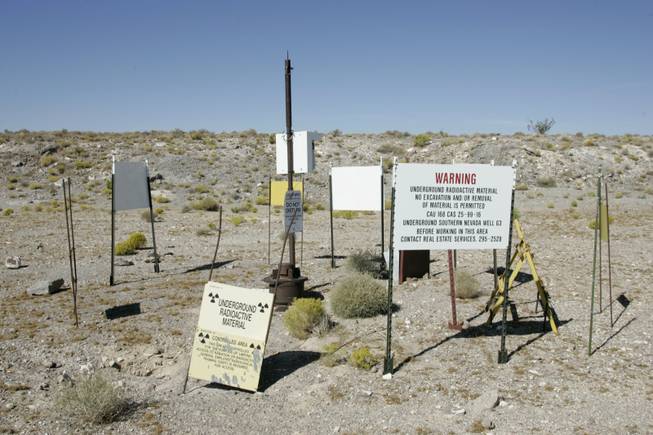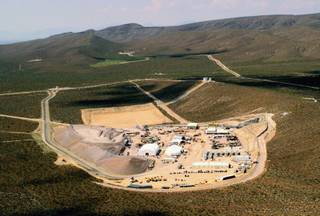
Atop Yucca Mountain, 90 miles northwest of Las Vegas, signs warn of possible radiation near a test well.
Friday, Jan. 29, 2010 | 10:51 a.m.
Sun Coverage
Sun topics
Declaring “We’re done with Yucca Mountain,” the Obama administration today announced the formation of a 15-member panel to study nuclear waste disposal alternatives -- another critical step in killing the proposed waste dump in Nevada.
The White House’s top energy adviser, Carol Browner, said Yucca Mountain is off the table as the new commission headed by Lee Hamilton and Brent Scowcroft begins a two-year process to study alternatives for handling the nation’s spent nuclear fuel.
“The debate over Yucca Mountain is over as the president has made clear,” Browner said during a conference call announcing the commission. “We’re done with Yucca. We need to be looking at other alternatives."
Scowcroft, the former national security adviser to two presidents, said the commission will be “trying to look forward, not back.”
“Nuclear waste storage at Yucca Mountain is not an option and the commission will be looking at better alternatives,” said Hamilton, the former congressman who also co-chaired the 9/11 Commission.
The formation of a panel to study alternatives was proposed last year as Obama announced his intention to dismantle the Yucca Mountain project he had vowed to kill.
Obama is scheduled to unveil his 2011 budget Monday. The spending plan is expected to zero out funds for Yucca Mountain, even as Obama called for “building a new generation of safe, clean nuclear power plants” in his State of the Union speech this week.
Nevada officials welcomed the development as a key step in the state’s decades-long battle to stop the proposed waste dump.
But Nevada’s team fighting the project also warned that until Obama pulls the Energy Department’s application to license Yucca Mountain or Congress rewrites the law allowing it, the project could merely be on hold.
A change in the political winds could allow a new president or supportive lawmakers to restart efforts to license the site.
“The key for us will be whether they withdraw the license and declare the site unsuitable or leave the license in place, perhaps suspended, while the commission does its work,” said Bruce Breslow, the executive director of the Nevada State Agency for Nuclear Projects, which opposes the dump.
“Is the commission looking at alternatives in the hopes there is one while they keep the possibility of Yucca on the back-burner or suspended? Or are they willing to finally admit the Yucca site is unsuitable and that’s why their going back to the drawing board.”
Nevada’s Washington lawmakers are confident the commission will take Nevada closer to being done with Yucca Mountain.
“President Obama and I have worked closely to stop dumping taxpayer money into Yucca, and I have fought hard to ensure Yucca Mountain is dead,” said Senate Majority Leader Harry Reid. “This panel of experts proposing other options for nuclear waste is the logical next step in that process.”
Democratic Rep. Dina Titus called the panel “another critical step forward in the effort to put a stop to Yucca Mountain once and for all.”
“I have been opposed to Yucca Mountain since day one and I have long worked with my colleagues to block it,” Titus said. “Today we are closer than ever to ensuring that Yucca Mountain never becomes a reality.”
Democratic Rep. Shelley Berkley said, "By taking Yucca Mountain off the table, commission members will be able to propose a safe and secure solution to America’s nuclear waste problem.”
The panel includes prominent voices in the nuclear debate in Washington including Allison Macfarlane, the George Mason University professor who has conducted critical research on Yucca Mountain; John Rowe, the CEO of the powerful Exelon energy company; former Republican Sen. Pete Domenici of New Mexico, the longtime chairman of a Senate energy committee; former Republican Sen. Chuck Hagel of Nebraska; Ernie Moniz, a leading professor of physics at the Masschusetts Institute of Technology; and Mark Ayers, president of the Building and Construction Trades Department at the AFL-CIO.
The panel is expected to study alternatives for 18 months and issue a report with 24 months, though the chairmen hope to finish sooner.


Join the Discussion:
Check this out for a full explanation of our conversion to the LiveFyre commenting system and instructions on how to sign up for an account.
Full comments policy